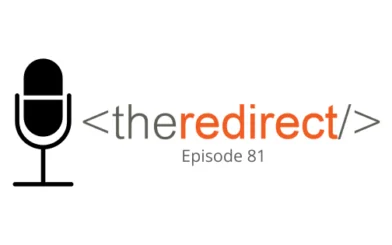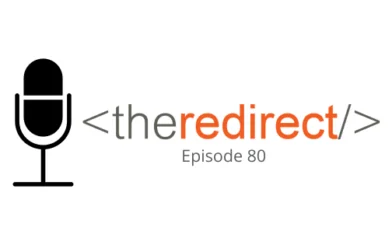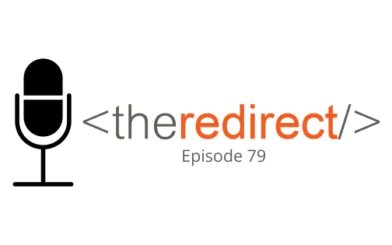Episode 29 / January 12, 2018
Listen now:
In this episode of The Redirect Podcast:
- Further discussions around Google’s mobile-first index and how this should shape your website strategy moving forward. (begins at 1:38)
- We walk you through the steps to check and see if you have beta access to the new Google Search Console and the insights you can gain. (begins at 15:35)
- Facebook changed its news feed prioritization to reduce the amount of content seen from brands (Pages). What could this mean for your brand? (begins at 22:33)
[We also mention Episode 28, in which we discussed voice search in 2018 and advertising on Amazon Alexa. Check it out!]
Google’s Mobile-First Index
There has been lots of talk this past year of mobile-first indexing. As Google continues on their pursuit to make the web a more mobile-friendly space, there are still a lot of marketers left trying to figure out just what exactly mobile-first indexing is and what it means to them.
What is Google’s Mobile-First Index?
Before we proceed, it is good to point out that it’s not that Google was maintaining a separate index for desktop or mobile; it’s more how Google was selecting the content they would show based on device type. Those of you with those outdated m.mydomain.com or mysite.com/mobile/ websites were the ones who most certainly would and will continue to feel the impact of this.
Mobile-first doesn’t mean “mobile-only,” either. What it means is that Google recognized that over 60% of searches are done on a mobile device; therefore, they need to have a search index that is best representative of how those mobile users might like to see and interact with content. If your site doesn’t have a mobile-friendly version, or isn’t responsive, it doesn’t mean it’s out of the running. It just means your chances of having a positive impact in the mobile world will diminish.
How Does a Mobile-First Index Affect Me?
If your site is already responsive and mobile-friendly, keep moving forward as you have – nothing to immediately worry about. Do keep in mind these changes are slowly rolling out, anyways, and this is not a major “mobilegeddon” switch taking place. For full details, check out Google’s Guidelines for Mobile-First Indexing.
If you do have a separate desktop version and mobile version of your website, then you should be a bit more concerned. Previously, desktop sites were given priority, as they were seen to have the highest value: most content, reputable, etc. Your mobile site should render the same.
Changes to PageSpeed Insights
Furthering the discussion around site performance, new changes come to Google PageSpeed Insight Tools that grades a page based on real user data from Google Chrome User Experience reports. While this sounds good, it will only show that level of data if your site is, in fact, generating that much traffic.
Using tools such as the PageSpeed Insights will also help you in understanding how your site is performing in the mobile space, as well. Keeping an eye on your site’s performance and positive user experiences will be key beyond 2018.
Google Search Console Beta
Back in Episode 25, Patrick talked about Google Search Console Beta and lamented that we didn’t yet have access. But this week: YAY, SEARCH CONSOLE BETA! Sort of. One of around 100 profiles in our Search Console account has been invited to try out the beta version of the tool. I (Patrick) discovered this about an hour before going live with the podcast, so I wasn’t able to dig too far into discovering all the best new options.
I found the invitation inside the “All Messages” file on the left hand side of Search Console. The subject will begin with “Introducing The New Search Console for xxx,” and with just a few clicks, you’re in.
I LOVE search analytics, but hate that it’s only good for 90 days currently. The new version can show you 16 MONTHS of data. That’s pretty amazing. As noted by The SEM Post, you get slow season, busy season, and one-offs with a window like that.
Another big area that was focused on with the updated Search Console was getting pages reindexed after an error or issue has been corrected. Currently, once you fix an issue and mark it as corrected in Search Console, you can notify Google, and they work to verify the fix and mark it fixed – but it’s nuanced and takes time. This process has been a strong focus of the new build, and the goal is to reduce the time it take for webmasters and Google to work together on this verification process.
There is so much more to come from the new search console, and we’ll be digging in as deep as we can with the limited account access that we currently have. As we get more beta access, we’ll share more.
Facebook News Feed Update
Not to be all “Facebook Apocalypse!!!!,” but we’ve been noticing a drop in organic reach on Facebook over time, and have long seen the writing on the wall. In Episode 22, Adrienne mentioned some testing Facebook was doing in other countries, in which brand and publisher content was relegated entirely to an “Explore” tab, rather than showing up on people’s news feeds as usual.
Well, it was announced by Facebook yesterday, January 11th, that over the next few months, they will be making updates to ranking that will create more “meaningful” interaction on Facebook, and consequently will have a negative impact on what Mark Zuckerberg referred to as “public content”: posts from businesses, brands, and media.
Adam Mosseri, Facebook’s VP of News Feed, explained this update is not the same as the recent tests involving the Explore tab. Page posts will still appear in users’ news feed, though it sounds like that will occur much less often. Content from brand pages will be demoted in favor of showing posts from friends and family near the top of the news feed. Keep reading on the blog: Facebook News Feed Update – Brands Lose Organic Reach




